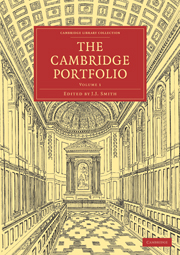Book contents
- Frontmatter
- DIRECTIONS FOR PLACING THE PLATES
- DESCRIPTION OF THE WOODCUTS
- LIST OF SIGNATURES
- ERRATA
- PREFACE
- INTRODUCTORY
- THE FIRST MILESTONE FROM CAMBRIDGE
- THE APPROACH AND PRINCIPAL AVENUE
- THE WALKS
- THE INSTALLATION IN 1835
- SOURCES OF HISTORY. I
- SOURCES OF HISTORY. II; COLLEGE HISTORIES
- A DREAM OF THE POETS
- MEMORIAL OF GONVILLE AND CAIUS COLLEGE
- FOVNDERS. I
- THE BOTANICAL GARDEN
- THE GOGMAGOGS
- TRINITY COLLEGE CHAPEL
- ON THE ANCIENT AMUSEMENTS OF THE UNIVERSITY
- A LEGEND OF THE HILLS
- SIGHED ON KING'S BRIDGE. OCT. 1838
- THE CAMBRIDGE PHILOSOPHICAL SOCIETY
- MUSEUM OF THE CAMBRIDGE PHILOSOPHICAL SOCIETY
- NOTICE OF WILLUGHBY
- THE BOAT-RACE
- NEVILLE'S COURT
- CRITIQUE ON GRAY
- AN INDEPENDENT TRIBUTE TO THE MEMORY OF THE RIGHT HON WILLIAM PITT
- SOURCES OF HISTORY. III: PRIVATE COLLECTIONS
- FOVNDERS. II
- PORTRAITURE OF DR. CAIUS
- THE UNION DEBATING SOCIETY
- ALABASTER
- CLARE HALL
- ORGANS
- POSTSCRIPT TO THE LEGEND OF THE HILLS
- ANECDOTES
- MILTON'S MULBERRY TREE
- BIOGRAPHICAL NOTICES
- The Cambridge Portfolio pp. 216-236
- VOCABULARY. I
- DR. LEGGE
- READING PARTIES
- THE CAM
- ANCIENT BRICK
- THE WOODWARDIAN MUSEUM
- THE COLLEGE COURSE
- THE CLUBS OF CAMBRIDGE
- OLD PLATE
- THE GARDEN AND COURTS OF GONVILLE AND CAIUS COLLEGE
- Plate section
- Frontmatter
- DIRECTIONS FOR PLACING THE PLATES
- DESCRIPTION OF THE WOODCUTS
- LIST OF SIGNATURES
- ERRATA
- PREFACE
- INTRODUCTORY
- THE FIRST MILESTONE FROM CAMBRIDGE
- THE APPROACH AND PRINCIPAL AVENUE
- THE WALKS
- THE INSTALLATION IN 1835
- SOURCES OF HISTORY. I
- SOURCES OF HISTORY. II; COLLEGE HISTORIES
- A DREAM OF THE POETS
- MEMORIAL OF GONVILLE AND CAIUS COLLEGE
- FOVNDERS. I
- THE BOTANICAL GARDEN
- THE GOGMAGOGS
- TRINITY COLLEGE CHAPEL
- ON THE ANCIENT AMUSEMENTS OF THE UNIVERSITY
- A LEGEND OF THE HILLS
- SIGHED ON KING'S BRIDGE. OCT. 1838
- THE CAMBRIDGE PHILOSOPHICAL SOCIETY
- MUSEUM OF THE CAMBRIDGE PHILOSOPHICAL SOCIETY
- NOTICE OF WILLUGHBY
- THE BOAT-RACE
- NEVILLE'S COURT
- CRITIQUE ON GRAY
- AN INDEPENDENT TRIBUTE TO THE MEMORY OF THE RIGHT HON WILLIAM PITT
- SOURCES OF HISTORY. III: PRIVATE COLLECTIONS
- FOVNDERS. II
- PORTRAITURE OF DR. CAIUS
- THE UNION DEBATING SOCIETY
- ALABASTER
- CLARE HALL
- ORGANS
- POSTSCRIPT TO THE LEGEND OF THE HILLS
- ANECDOTES
- MILTON'S MULBERRY TREE
- BIOGRAPHICAL NOTICES
- The Cambridge Portfolio pp. 216-236
- VOCABULARY. I
- DR. LEGGE
- READING PARTIES
- THE CAM
- ANCIENT BRICK
- THE WOODWARDIAN MUSEUM
- THE COLLEGE COURSE
- THE CLUBS OF CAMBRIDGE
- OLD PLATE
- THE GARDEN AND COURTS OF GONVILLE AND CAIUS COLLEGE
- Plate section
Summary
In 1627 was published a book called Vox Piscis or the Book-Fish. The preface quaintly relates the story of its origin :— it was simply this, that the sheets from which the matter was taken were found in the maw of a cod-fish that was caught on “Lin deeps.” From the fisherman it came to the Cambridge market; it was opened in common course, and the book produced, where Benjamin Prime the Batchelor's beadle seeing it, had it conveyed to the Vice-Chancellor who took special notice of it, and made inquisition into the truth of the matter. The book was put into the hands of a binder to be restored: the story soon became known and was proclaimed by letter in all parts of the world. This happened at Commencement when it may be supposed fish were in request; the wonder excited by the event was great, and the talk spread wide: some spoke in earnest, others in joke ;—
“A yongue Scholar (who had in a Stationer's shop peeped into the Titles of the Ciuill Law) there viewing this vnconcocted booke in the Codd-fish, made a Quiblet thereupon, saying, ‘that it might be found in the Code, but could neuer be entred into the Digest.’” “Another said or wrote, ‘that hee would hereafter never count it a reproach to be called Codshead, seeing that fish is now become so learned an heluo librorum,’ which signifieth a man of much reading, or skilfull in many bookes.”
- Type
- Chapter
- Information
- The Cambridge Portfolio , pp. 200 - 206Publisher: Cambridge University PressPrint publication year: 2010First published in: 1840



